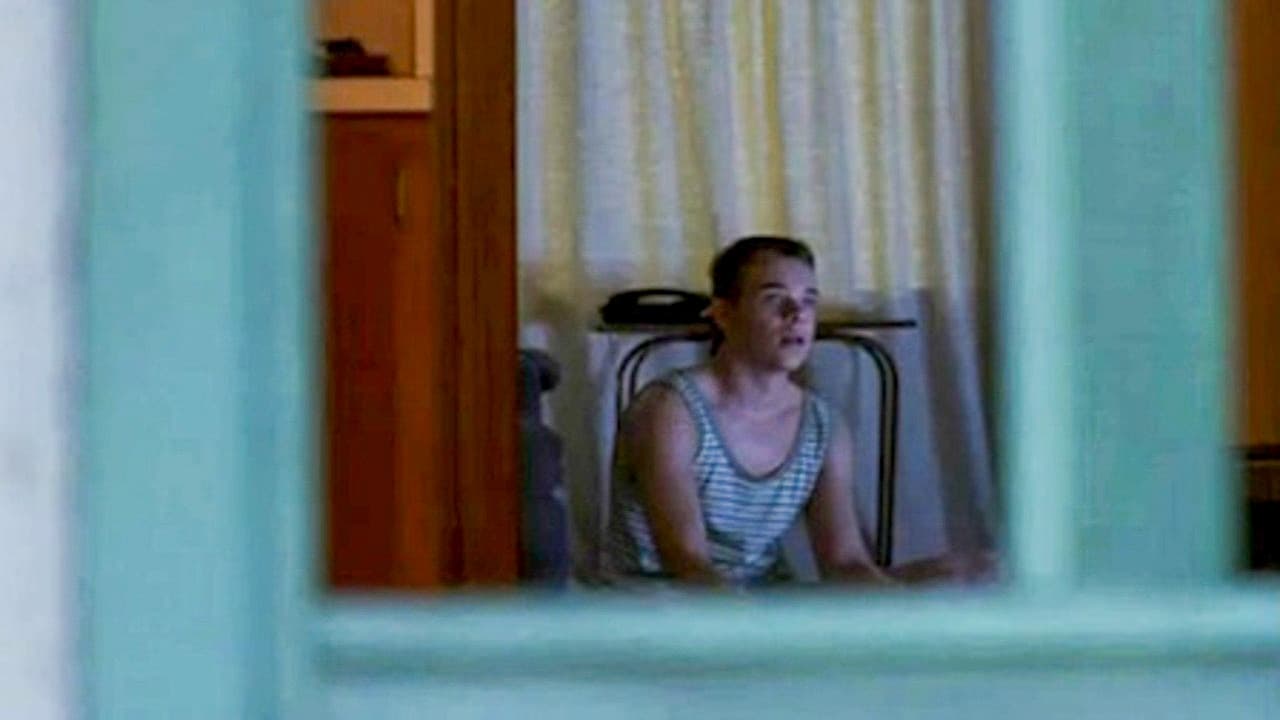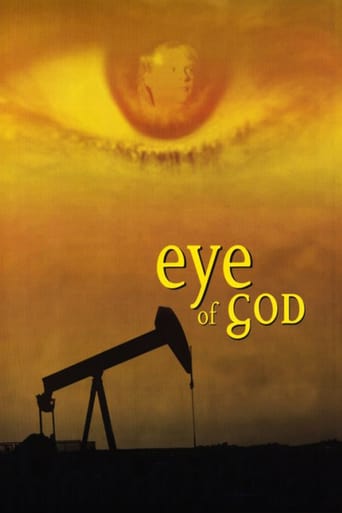VividSimon
Simply Perfect
Ensofter
Overrated and overhyped
Kien Navarro
Exactly the movie you think it is, but not the movie you want it to be.
Erica Derrick
By the time the dramatic fireworks start popping off, each one feels earned.
Lechuguilla
With explicit references to the Bible, "Eye Of God" is a thought provoking film that explores the effect of religious faith on the relationship between a lonely young woman named Ainsley (Martha Plimpton) and Jack (Kevin Anderson), the prison parolee whom Ainsley befriends. In its realism and its setting in rural Oklahoma, "Eye Of God" reminds me of "Silkwood". Both films are depressing, sad, and have a fatalistic quality to them. Both films explore life and death issues. And in both films, the essential question is not who, or when, or how, but ... why.In style, "Eye Of God" is simple, direct, low-key, and personal. There's very little camera movement. Typically framed by doors or windows, most scenes are unobtrusive locked-off shots of characters talking. The cinematography is totally not flashy nor gimmicky in any way. The acting is direct, restrained, understated, and high in quality. Martha Plimpton gives a flawless performance. I was also impressed with the performance of Margo Martindale, in a support role. Further elevating the overall acting is Hal Holbrook who gives his usual raspy voice performance as the town sheriff.There's very little score. At times, country songs can be heard in the background. The film opens with the beautiful gospel recording of "Live With Jesus", by Wynonna Judd.Some viewers may not like the story's non-linear structure. The film uses time-cuts to force the plot ahead and then back in time in such a way that scenes are not necessarily in chronological order. But the scenes are always thematically related. As the film moves along, the various seemingly unrelated threads come together. And it all makes sense in the end.This is a movingly personal film whose theme runs deep. As such, nearly all viewers can connect with one or more characters in some way. The film is entertaining for its high quality acting and for its interesting cinematography. But more than that, this is a film with a profound message relevant to contemporary audiences. "Eye Of God" is one of the best films of the last fifteen years.
tbiegalski
This is a wonderful study of the face of evil and its impact upon the lives of its characters. The narrative is nonlinear and may be confusing at first if one is not warned, but once a viewer is aware of this he/she should have no difficulty understanding the film. The storyline is initially split and follows two seemingly unrelated characters, which are somehow (at first we don't know) linked through a third subplot involving a small-town sheriff and some crime which has yet to be revealed. One storyline involves a teenage boy who has experienced the worst type of loss and is now emotionally alone in the world. And there is a small-town waitress who has established a relationship with an ex-con over years in a pen-pal program. The waitress has a glass-eye which is a symbolic reference to the movie's title. This glass-eye exists in the world of the inanimate, and the scenes of human despair and sorrow are reflected in and across it without judgment, action, or recourse, as the Eye of God viewing this world exists totally separated of its theater. At the film's end we are reminded of the story of Abraham and Isaac and that the actions of any Judeo-Christian god are very seldom held up to the same standards to which he holds his people. This movie took my breath away and haunted me for days after I initially saw it. It's memory still haunts me.
rava-1
I rented this one just as a Nick Stahl fan but was really amazed by how good it was. The disturbing tone and plot line stuck with me for days after viewing it. Stahl was wonderful as a traumatized boy who is just barely surviving his pain. Stahl's work in this film just hints at the depths of talent we may yet see from him. I don't think that Martha Plimpton has EVER been better in her role as a young woman searching for love and redemption. Hal Holbrook, his face a mixture of world-weariness, sadness and kindness, is the real center of the film and he does an amazing job.
One of the most moving things about this film was the idea that deep tragedy can strike at the most seemingly mundane of moments. Coupled with this is the concept that one can never really know what is in another's heart or mind. Because of the narrative form, one knows tragedy will strike, but the director purposefully seems to suggest that tragedy could enter into any setting, at any moment, with no warning. The bookend examination of the story of Abraham and Isaac is ultimately successful because Isaac (like the characters and viewer) was asked to have faith without any proof that seemingly negative events may have a positive reason. The director doesn't offer any pat answers to this dilemma, but he does show that tragedy can overwhelm a person.
awalter1
Jack is released from prison and meets up with Ainsley, a young woman he has been writing letters to for quite some time. Ainsley is a sweet romantic simpleton who doesn't even want to know about the crime that put him in prison. Jack believes that he has been reformed by the justice system and by religion, but he's also a control freak. For strange reasons lost in the mysteries of the human heart, these poor souls decide to start a relationship.One can't give away too much of the plot without collapsing the nonlineary framework of the film and ruining its breathtaking effect. So suffice it to say that this recipe for disaster is tossed up in the air along with the biblical story of God asking Abraham to sacrifice his son Isaac and with all the theological and ethical problems both of these stories present. Everything builds to a whirling climax of nonlinear convergence and small-scale horror. In the end the audience is brought face-to-face with that grand philosophical theme "the problem of evil," and we find no easy solutions.

